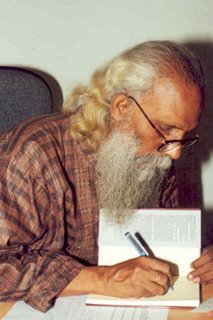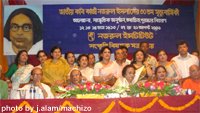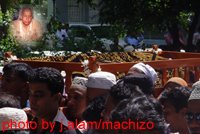Nirmalendu Goon
 Nirmalendu Goon (born 1945) is a Bangladeshi poet. He was born in Netrokona, Bangladesh. Goon is one of the most popular poets in Bangladesh, lauded by many for his accessible verse in an age where Bangla poetry has become increasingly complex.
Nirmalendu Goon (born 1945) is a Bangladeshi poet. He was born in Netrokona, Bangladesh. Goon is one of the most popular poets in Bangladesh, lauded by many for his accessible verse in an age where Bangla poetry has become increasingly complex.Poetry:
His first book of poems was published in 1970. Since then he has published forty-five collections of poetry and twenty collections of prose. Part of the generation of poets of 1960s, Goon's poetry contains stinging criticism of the nouveau-rich and a touching description of the contrasting fate of the masses. A love of freedom and faith in the human spirit also permeates many of his poems. Unabashedly marxist, he has written poems urging an upheaval of the poor against the rich. He also has written a number of poems on important personalities, including Rabindranath, Sheikh Mujib, Lenin, Shakti Chattopadhyay , and others.
Bangla Academy Award is a literary award given by the Bangla Academy of Bangladesh. The award is given in recognition of creative genius in advancement and overall contribution in the field of Bangla language and literature.
Bangla Academy award was introduced in 1960. Until 1984, the award was offered in six categories including poetry, novel, short stories, essays, juvenile literature and translation. From 1985, two more awards were introduced to recognize two writers for their overall contributions to Bangla language and literature.
Ekushey Padak is one of the highest civilian awards in Bangladesh. The award was introduced in memory of the martyrs of the Language Movement that took place on February 21, 1952.
Souce: wikipedia.







